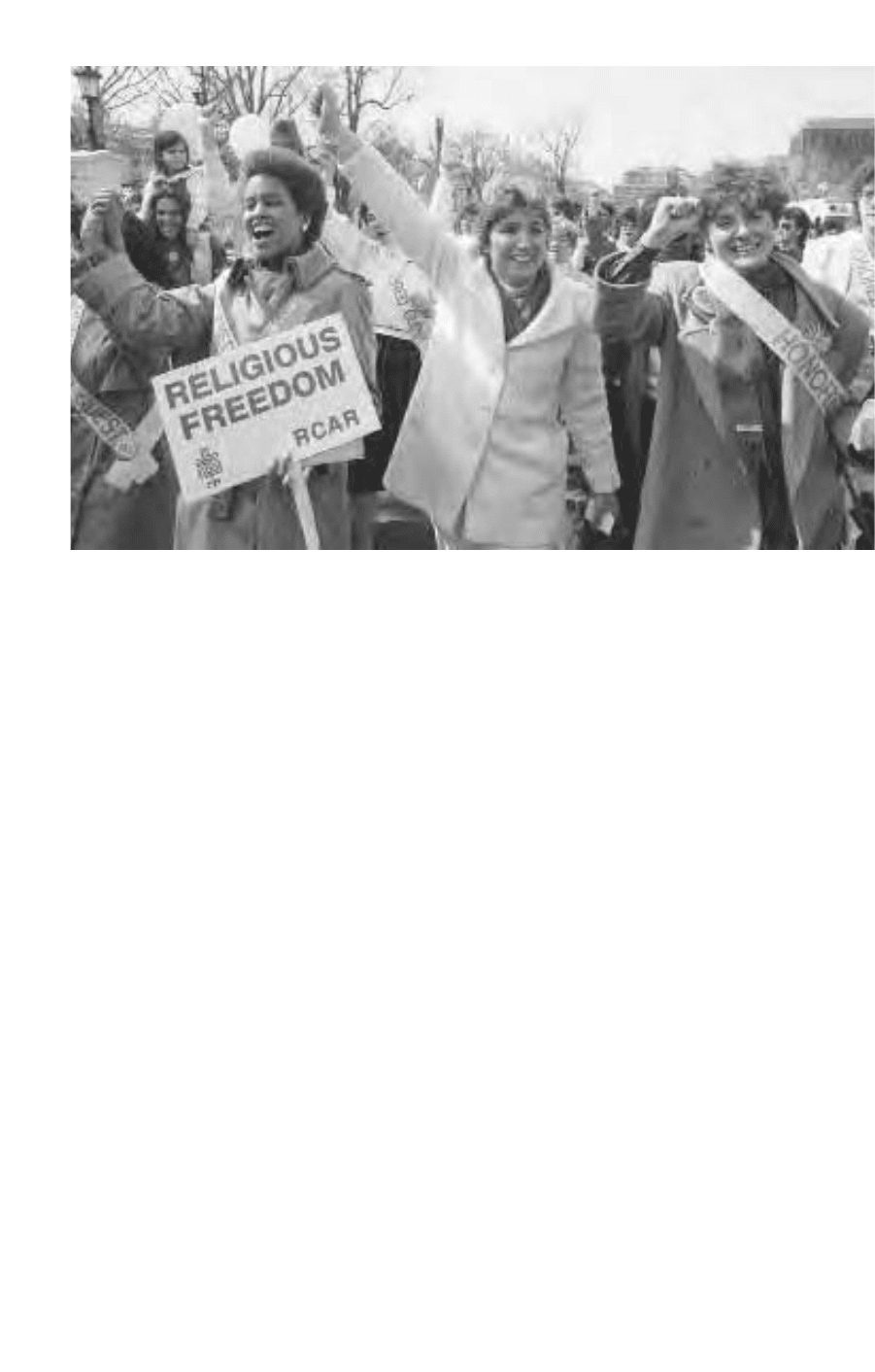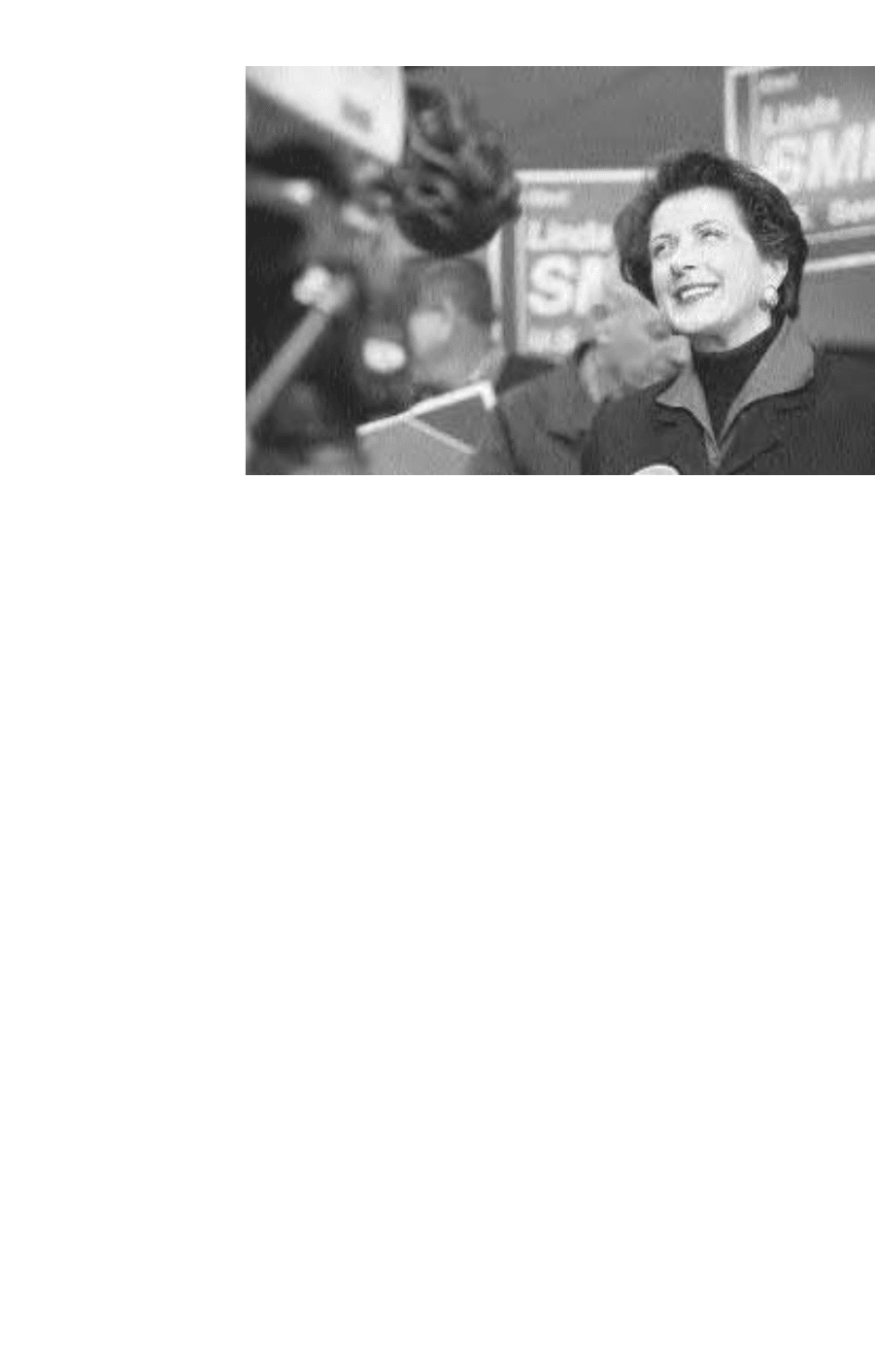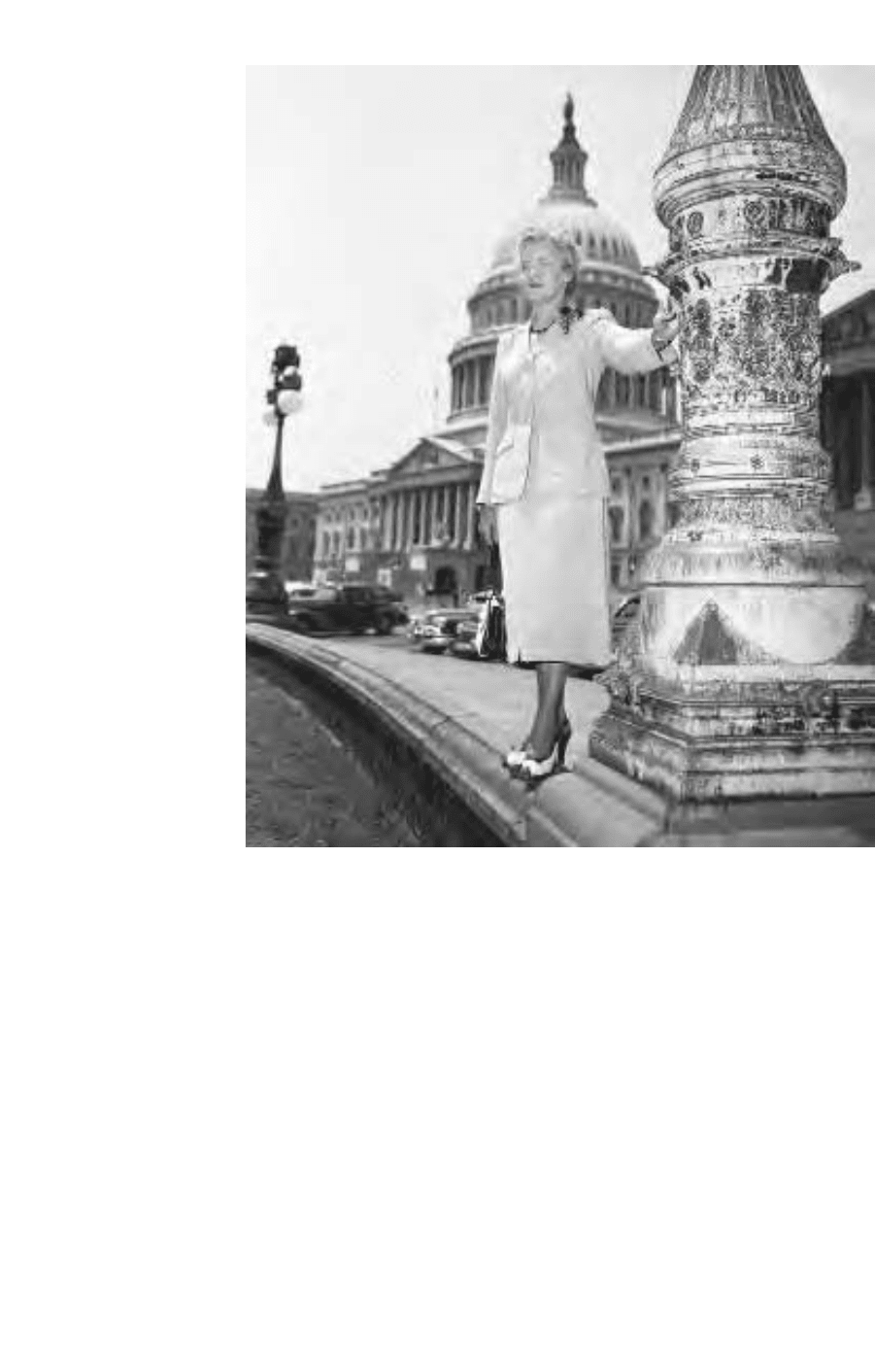Schenken Suzanne O’Dea. From Suffrage to the Senate: An Encyclopedia of American Women in Politics (2 Volumes)
Подождите немного. Документ загружается.


Simpson, Edna Oakes (1891–1984)
Republican Edna Simpson of Illinois served in the U.S. House of Repre-
sentatives from 3 January 1959 to 3 January 1961. Nine days after the
death of her husband, Representative Sidney Simpson, Edna Simpson was
elected to the seat he had held. She did not make any campaign appear-
ances but easily won the contest. Simpson never spoke on the House floor.
She announced in December 1959 that she would not be a candidate for
reelection.
Edna Simpson was born in Carrollton, Illinois.
See also Congress, Women in
References Office of the Historian, U.S. House of Representatives, Women in
Congress, 1917–1990 (1991).
Slaughter, Louise McIntosh (b. 1929)
Democrat Louise Slaughter of New York entered the U.S. House of Rep-
resentatives on 3 January 1987. Slaughter held the leadership position of
minority whip–at–large in the 106th Congress (1999–2001). Congress-
woman Slaughter has passed legislation that created the first federal re-
search and education program on DES, a drug that was erroneously
thought to prevent miscarriage but that can cause birth defects and other
problems in subsequent generations. She helped increase appropriations
for breast cancer research and was responsible for the creation of a per-
manent Office of Women’s Health at the National Institutes of Health
(NIH) and for guaranteeing that women and minorities are included in
all health trials at the NIH. An author of the Violence Against Women Act
of 1994, she succeeded in including immigrant spouses in it. She passed a
measure that gives states an incentive to make it easier for homeless chil-
dren to attend school. Slaughter also passed legislation to establish a
Women’s Rights National Historic Trail.
Slaughter was one of the seven Democratic congresswomen who
marched to the Senate to register their concerns about the sexual harass-
ment charges against U.S. Supreme Court nominee Clarence Thomas.
Their goal was to convince the Senate Judiciary Committee to investigate
the charges before voting on his nomination.
Slaughter passed an amendment for a special tax break that allows
small manufacturers and farmers to issue tax-exempt bonds through lo-
cal governments and has worked for the development of a high-speed
railroad. In other areas, Slaughter helped pass a measure to end the
dumping of sewage sludge in the ocean and another to help older women
attend college by expanding financial aid to part-time and other nontra-
ditional students.
Slaughter, Louise McIntosh 619

Born in Harlan County, Kentucky, Louise Slaughter received her
bachelor of science degree in 1951 and her master of science degree in
1953, both from the University of Kentucky. Slaughter was a Monroe
County legislator from 1975 to 1979 and served in the New York Assem-
bly from 1983 to 1987.
See also Congress, Women in; Health Care, Women and; Hill, Anita Faye; Sex-
ual Harassment; State Legislatures, Women in; Violence Against Women Act of
1994; Women’s Health, Office of Research on
References Congressional Quarterly, Politics in America 1994 (1993); Office of
the Historian, U.S. House of Representatives, Women in Congress, 1917–1990
(1991); www.house.gov/slaughter/bio.htm.
Smeal, Eleanor Cutri (b. 1939)
President of the National Organization for Women (NOW) from 1977 to
1982 and from 1985 to 1987, Eleanor Smeal was a cofounder and found-
ing president of the Fund for the Feminist Majority in 1987. Smeal en-
tered politics out of frustration. After completing her master’s degree, she
had intended to pursue a doctorate, but the lack of child care prevented
her from continuing. Later, when she suffered a back ailment that re-
quired her to take a year of complete bed rest, she again found there were
no child care services available. Through the experience, she also became
aware of the need for disability insurance for wives and mothers. Smeal
and her husband, who had performed many household tasks during that
year, became confirmed feminists, opened a day care center, and in 1970,
joined NOW.
620 Smeal, Eleanor Cutri
Eleanor Smeal,
president of the
National Organiza-
tion for Women, led
thousands of pro-
choice activists in a
march on Washing-
ton, D.C., 1986
(Corbis/Bettmann)

From 1971 to 1973, Smeal convened and served as the first president
of a NOW chapter in suburban Pittsburgh, Pennsylvania, and was elected
president of Pennsylvania NOW in 1972. She made educational injustice
her priority and worked for equal opportunity for girls in physical educa-
tion and sports programs. Smeal joined NOW’s national board of direc-
tors and its legal defense and education board of directors in 1973 and was
elected national president four years later. Smeal led efforts to ratify the
Equal Rights Amendment (ERA), including a boycott of states that had
not yet ratified the ERA. She was appointed to the National Commission
on the Observance of International Women’s Year, 1975, by President
Jimmy Carter and was a visible leader at the National Women’s Confer-
ence held in Houston, Texas, in 1977. When she became president, the or-
ganization had 55,000 members and a deficit of $120,000. At the end of
her first tenure as president in 1982, NOW had 225,000 members and a
budget of more than $9 million.
Born in Ashtabula, Ohio, Smeal earned her bachelor of arts degree
from Duke University in 1961 and her master of arts degree from the Uni-
versity of Florida in 1963.
See also Equal Rights Amendment; The Feminist Majority; National
Organization for Women; National Women’s Conference
References H. W. Wilson, Current Biography Yearbook, 1980 (1980).
Smith, Howard Worth (1883–1976)
Democrat Howard Worth Smith of Virginia served in the U.S. House of
Representatives from 1931 to 1967. Although he was opposed to civil
rights legislation, he played a crucial role in expanding Title VII of the
Civil Rights Act of 1964 to include women. As the House debated Title
VII, Smith introduced a one-word amendment, “sex,” to the section re-
lated to employment discrimination. Some observers have attributed his
motives for introducing the amendment to a desire to kill the entire bill.
Others have suggested that he introduced it at the request of the National
Woman’s Party. Regardless of his motives, congresswomen and others
who supported the amendment also supported Smith’s introduction of it,
correctly believing that other southern congressmen would follow Smith’s
lead and vote for it. When the amendment and the bill passed, employ-
ment discrimination on the basis of sex, race, color, and national origin
became illegal.
Born in Broad Run, Virginia, Smith graduated from Bethel Military
Academy in 1901 and earned his bachelor of laws degree from the Uni-
versity of Virginia in 1903. He entered private practice in Alexandria, Vir-
ginia, the next year. Smith served as commonwealth attorney of Alexan-
dria from 1918 to 1922, judge in Alexandria’s Corporation Court from
Smith, Howard Worth 621

1922 to 1928, and judge in the 16th Judicial Circuit of Virginia from 1928
to 1932.
See also Civil Rights Act of 1964, Title VII; National Woman’s Party
References Freeman, “How ‘Sex’ Got into Title VII: Persistent Opportunism
as a Maker of Public Policy” (1991); New York Times, 4 October 1976.
Smith, Linda A. (b. 1950)
Republican Linda Smith of Washington served in the U.S. House of Rep-
resentatives from 3 January 1995 to 3 January 1999. Her strong antiabor-
tion beliefs and anger over a state tax increase motivated Smith to enter
politics. She served in the Washington House of Representatives from
1983 to 1987 and in the state Senate from 1987 to 1995. She authored two
state initiatives, one for campaign and ethics reform and one to limit state
expenditures and taxes, both approved by voters. Smith won her place on
the 1994 general election ballot through a write-in petition drive for the
Republican primary, the first person in Washington state history to qual-
ify through that route. The work she had done on the ballot initiatives and
her strong support among Christian activists gave her the grassroots base
she needed. The all-volunteer Smith organization called 40,000 house-
holds and mailed write-in instructions to 150,000 households.
Congresswoman Smith concentrated on campaign finance reform,
and worked to ban political action committees (PACs), create voluntary
campaign spending limits, and ban certain kinds of political contribu-
tions. Smith explained her motives: “You’re elected as an idealist and
thrown into the sewer. People believe [Congress] is a sewer, and they
elected a bunch of cleaners to go in and clean it up.” Smith’s other priori-
622 Smith, Linda A.
Representative Linda
Smith (R-WA) ran
unsuccessfully
against Senator Patty
Murray for the U.S.
Senate in 1998
(Associated Press AP)

ties include a balanced budget, elimination of corporate welfare, Social Se-
curity reform, tax reform, breast cancer research, and natural resources
management. She was an unsuccessful candidate for the U.S. Senate in
1998, having lost to the Democratic incumbent, Patty Murray.
Born in La Junta, Colorado, Smith managed tax consulting centers
and was a tax consultant.
See also Congress, Women in; State Legislatures, Women in
References Congressional Quarterly, Politics in America 1994 (1993), Politics in
America 1996 (1995), Politics in America 1998 (1997); www.house.gov/linda-
smith/bio.htm.
Smith, Margaret Madeline Chase (1897–1995)
Republican Margaret Chase Smith of Maine served in the U.S. House of
Representatives from 3 June 1940 to 3 January 1949 and served in the U.S.
Senate from 3 January 1949 to 3 January 1973. She is the first woman to
win election to both houses of Congress and the first woman nominated
for the presidency at a major national party convention. In 1930, she mar-
ried Clyde Smith and through him entered politics. When Clyde Smith
won a seat in the U.S. House of Representatives in 1936, his wife joined his
staff. When he died in 1940, she won the race to fill the vacancy.
Congresswoman Smith did not view herself as a feminist or an ad-
vocate for women, saying: “I definitely resent being called a feminist.”
Women assumed that she would be sympathetic to them, however, and
Smith responded to several gender-based difficulties, including ending
barriers to women’s employment, securing maternity and infant care for
military dependents at base hospitals, and developing support for public
nurseries and day care centers. She also introduced and passed a measure
that granted permanent regular status for women who served in auxiliary
units of the military and worked for passage of the 1948 Women’s Armed
Services Integration Act.
When Maine’s senior senator announced in 1948 that he would not
run for reelection, Smith entered a three-way primary, running on the slo-
gan “Don’t trade a record for a promise.” National security was the issue
she considered most important, also noting that the housing shortage the
nation faced was a disgrace. She won both the primary and the general
elections.
On 1 June 1950, Senator Smith and six other Republican senators
wrote a speech titled “A Declaration of Conscience,” which Smith deliv-
ered. Aiming at Senator Joseph McCarthy’s anti-Communist excesses
without saying his name, she accused her colleagues of permitting indi-
vidual senators to abuse their power by making unproven charges that de-
famed innocent Americans. She told the Senate: “I do not like the way the
Smith, Margaret Madeline Chase 623

Senate has been made a rendezvous for vilification, for selfish political gain
at the sacrifice of individual reputations and national unity....I do not
want to see a party ride to political victory on the Four Horsemen of
Calumny—fear, ignorance, bigotry, and smear.” After she had read the
statement, five of the six male cosponsors withdrew their names, fearing
retribution from McCarthy. McCarthy punished Smith for criticizing him
by having her removed from an important subcommittee and from the
Republican Policy Committee. In 1954, he recruited a primary opponent
to run against Smith, but she won the primary and general elections. A
strong anti-Communist herself, Smith voted to censure McCarthy in 1954.
In 1964, Smith announced her candidacy for the Republican presi-
dential nomination but received only a few votes at the Republican Na-
tional Convention later that year. Smith lost her attempt for a fifth Senate
term in 1972. In retirement, she was a college lecturer.
624 Smith, Margaret Madeline Chase
Margaret Chase
Smith (R-ME), the
first woman to serve
in both the House
and the Senate,
fought for child care
and integration of
women into the
military, 1950
(Corbis/Bettmann)

Born in Skohegan, Maine, she was a primary schoolteacher following
graduation from high school. She was also a telephone operator and com-
mercial manager of a telephone company, circulation manager of a weekly
newspaper, office manager of a woolen mill, and treasurer of a waste
process company.
See also Congress, Women in
References Boxer, Strangers in the Senate (1994); Wallace, Politics of Conscience:
A Biography of Margaret Chase Smith (1995).
Smith, Mary Louise (1914–1997)
Elected chairperson of the Republican National Committee (RNC) on 16
September 1974, she was the first and only woman to hold the position.
Smith began her political career in Eagle Grove, Iowa, in the late 1940s.
Like many women of the time, she entered the political arena at the
precinct level, knocking on doors during campaigns, and recruiting and
organizing women for the Republican Party. Although she held a number
of local and county offices in the party, she devoted most of her attention
to the National Federation of Republican Women, holding local and state
offices in it. She once explained that in those early days, “If someone told
me that I would be party chairman, I don’t know if I would have known
what they were talking about.”
In the early 1960s, having worked for the party for almost two
decades, she concluded that she wanted to be among those making the
party’s policy decisions. When the incumbent Republican national com-
mitteewoman for Iowa retired, Smith saw an opportunity and took it.
Elected Republican national committeewoman for Iowa in 1964, she won
reelection four more times, retiring in 1984. She served on the RNC Com-
mittee on Convention Reforms in 1966; was a member of the U.S. delega-
tion to the Fifteenth Session of the Population Commission of the Eco-
nomic and Social Council of the United Nations in 1969; and was a
member of the U.S. Delegation to the Third Extraordinary Session of the
General Conference of the United Nations Educational, Scientific, and
Cultural Organization in Paris in 1973.
In February 1974, George Bush, then RNC chairman, appointed
Smith cochair of the RNC. At the time, the party’s image was being badly
damaged by President Richard Nixon’s involvement in the Watergate
scandal. Smith’s grassroots organizational skills, her notable speaking
skills, and her extensive knowledge of party organization were viewed as
important assets in sustaining party members’ loyalty and commitment as
the scandal continued to unfold. In a clearly hopeless quest, Smith trav-
eled the country that summer, attempting to motivate Republicans to rally
around their party and support candidates in the fall elections.
Smith, Mary Louise 625

After Nixon resigned in August 1974, President Gerald Ford granted
George Bush’s request to leave the RNC and become U.S. envoy to China.
At the same time, Bush recommended that Smith become chair of the
RNC. Her election to the office by the Republican National Committee,
based upon Ford’s recommendation, was received with mixed reactions.
Feminists lauded it as an important step forward for women, whereas
conservatives questioned whether she was tough enough and objected to
her feminist beliefs. Political observers and party conservatives speculated
that she would hold the office for only a short time before being replaced,
probably after the fall elections.
Despite Smith’s efforts, the fall elections were a disaster for the party.
Republican candidates at every level of government lost their races as vot-
ers expressed their outrage over Watergate. Following the elections, Smith
believed that her primary objective was to rebuild the party. Her efforts
included an ambitious, innovative, and controversial public relations, ad-
vertising, and fund-raising program. She also began planning the 1976
Republican Convention. When she gaveled the convention to order, she
became the first woman of either major party to organize and convene a
presidential nominating convention. Gerald Ford, the party’s presidential
nominee, lost that November, and Smith resigned the chairmanship in
January 1977.
Throughout those years, Smith’s identity as a feminist had evolved,
and she had become a strong advocate of the Iowa and the federal Equal
Rights Amendments, civil rights, and reproductive rights. President Ronald
Reagan appointed Smith to the U.S. Commission on Civil Rights in March
1982. She served as its vice chair until November 1983, when it was reor-
ganized. Despite agreements that Smith would be appointed to the new
commission, her outspoken advocacy for strengthening civil rights en-
forcement did not coincide with the Reagan administration’s views, and
she was not appointed to the new commission. The public’s protests over
the decision to leave her off the commission provided Smith with a forum
to discuss the history, significance, and imperatives of civil rights enforce-
ment in this country. As the Republican Party became increasingly more
conservative in the 1980s and 1990s, she publicly criticized it for abandon-
ing its support for reproductive rights and the Equal Rights Amendment.
She was a founder of the Iowa Peace Institute and a member of its
board from 1986 to 1990, the year she resigned to accept an appointment
to the board of the U.S. Institute of Peace, where she served until her death
in 1997.
Born in Eddyville, Iowa, on 6 October 1914, she received a bachelor’s
degree in social work administration from the University of Iowa in 1935.
She met and married Elmer Smith while studying there.
626 Smith, Mary Louise

See also National Federation of Republican Women; Republican Party, Women
in the
Smith, Virginia Dodd (b. 1911)
Republican Virginia Smith of Nebraska served in the U.S. House of Rep-
resentatives from 3 January 1975 to 3 January 1991. Smith and her hus-
band farmed in Nebraska, where she became involved in educational and
agricultural associations. She entered public life as a member of the state’s
school board association in 1949 and served until 1960. National presi-
dent of the American Country Life Association from 1951 to 1954 and na-
tional chair of American Farm Bureau Women from 1954 to 1974, she
also served on the National Cattle and Livestock Board from 1955 to 1958.
Secretary of Agriculture Ezra Taft Benson appointed her to the Home
Economics Research Advisory Committee in 1955. She was also a Repub-
lican county chair and a delegate to national party conventions. In 1971
and 1972, Smith chaired the Presidential Task Force on Rural Develop-
ment, and from 1972 to 1974 she served on an advisory board for the De-
partment of Health, Education, and Welfare.
Smith’s success in her 1974 candidacy for the U.S. House of Repre-
sentatives was notable because it was the first public office she sought, but
more notably it was the year in which President Richard Nixon resigned in
the wake of the Watergate scandal, and few Republicans won their races.
Smith’s interests in Congress reflected her agricultural and rural back-
ground and that of her district. She worked on water development pro-
grams that were important to wheat growers in her area. She fought for one
program for more than a decade but lost to environmentalists and spend-
ing cuts during the Reagan administration. She obtained funding for agri-
cultural research centers in Nebraska and kept rural post offices and rural
weather stations open in Nebraska when comparable facilities were closed
around the country. In addition, she defended and preserved appropria-
tions for the Rural Electrification Administration, an important source of
inexpensive electricity for rural residents. She also worked to protect the
interests of cattle and wheat producers and supported farm exports.
Born near Randolph, Iowa, Virginia Smith attended Missouri State
Teachers College for two years before transferring to the University of Ne-
braska at Lincoln in 1929. Unable to afford to complete her undergradu-
ate studies at the time, she completed her bachelor’s degree in education
at the University of Nebraska in 1936.
See also Congress, Women in
References Congressional Quarterly, Politics in America 1984 (1983); Süllwold,
“Nebraska’s Virginia” (1993).
Smith, Virginia Dodd 627

Snowe, Olympia Jean Bouchles (b. 1947)
The first Greek American woman elected to Congress, Republican
Olympia Snowe of Maine served in the U.S. House of Representatives from
3 January 1979 to 3 January 1995, and she entered the U.S. Senate on 4 Jan-
uary 1995. She held the leadership position of vice chair of the Senate Re-
publican Conference in the 105th and 106th Congresses (1997–2001).
Snowe entered politics while still in college, working as a summer in-
tern for a Democratic governor. After changing her party registration in
the late 1960s, she joined the district staff of a Republican member of
Congress in 1972. Following the death of her first husband, a state repre-
sentative, she won the election to fill the vacancy in 1973. She served in the
Maine House of Representatives until 1977 and then served in the Maine
Senate from 1977 to 1979. While in the state Senate, she became known
for her work on health care legislation.
In the U.S. House of Representatives, Snowe worked to change the
federal funding formula to give less populous states, like Maine, a larger
portion of federal grants. Particularly concerned with energy assistance to
low-income families and energy conservation, she successfully fought for
the restoration of some of these funds in 1981 and 1982. She also suc-
ceeded in pushing for duty-free transportation of steam energy across the
Canadian border, supporting it as a form of alternative energy.
Cochair of the Congressional Caucus for Women’s Issues, Snowe
helped develop the Economic Equity Act and helped pass portions of it.
She supports federal funding for family planning and reproductive rights
and has worked for employer tax credits for child care. She has sought
funding for a local Job Corps center and attempted to keep the
Portsmouth Naval Shipyard in Maine open.
628 Snowe, Olympia Jean Bouchles
Senator Olympia
Snowe (R-ME) spoke
to reporters outside
the Senate chambers
during the impeach-
ment trial of Presi-
dent Bill Clinton,
1998 (Corbis/AFP)
